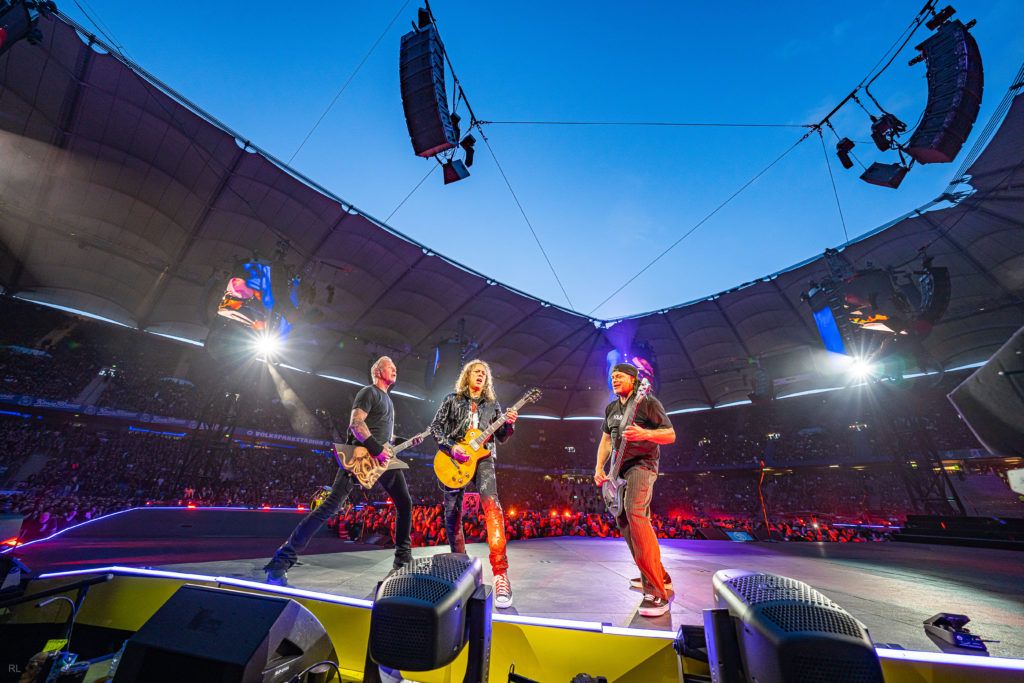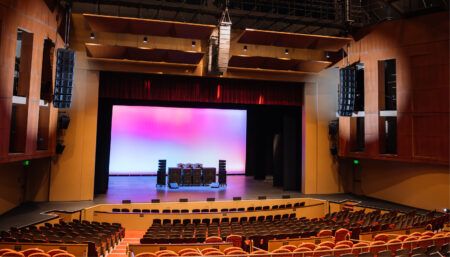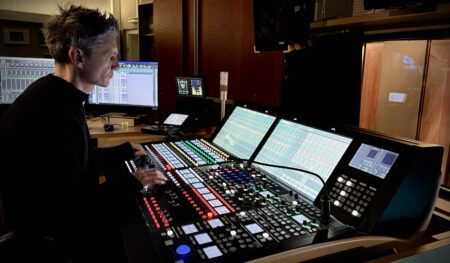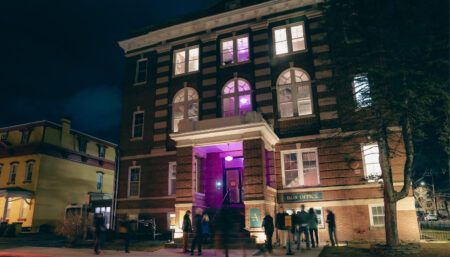Metallica recently kicked off its two-year M72 World Tour in Europe, with a production featuring in-the-round staging. Configured to immerse the entire audience in the band’s sound – at full bandwidth across a broad stereo landscape – the Meyer Sound system chosen comprises a record 288 Panther large-format linear line array loudspeakers.
The band and long-time creative director Dan Braun set about moving beyond old paradigms. Two concerts will be presented at every tour stop, with completely separate music sets for each show. The ‘snake pit’ has been relocated inside a ring-shaped stage, requiring four drum kits for Lars Ulrich to rise up as needed. Also, the sonic field has been expanded to ensure a wide stereo spread of guitars and drums at every seat and standing point in the stadium.
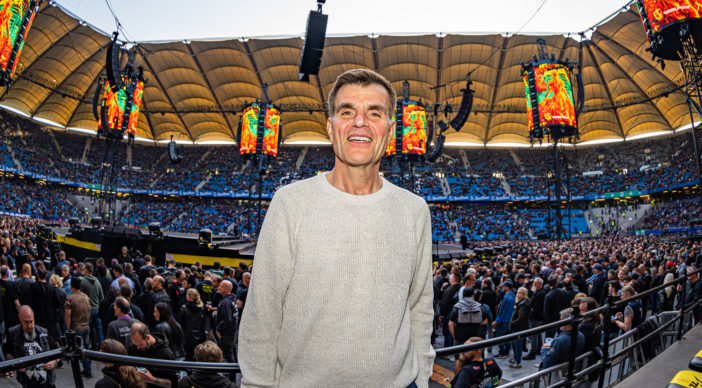
“I’m always concerned about making all these new ideas work at scale, but we have great partners to rely on, not the least of which is Meyer Sound,” said Braun, “So, I never let things like practicality and logistics inhibit the creative process.”
Braun took his idea for the tour sound directly to company founders John and Helen Meyer, who captured his vision and assigned Bob McCarthy, director of system optimisation, to design audio for the tour.
“I told Bob that my goal was to have full stereo sound at every point with no overlap, from the centre pit to the nosebleed seats,” Braun continued. “We wanted everybody to hear the band as if with near-field monitors, and I think we’ve come closer to that than ever before in a concert setting.”
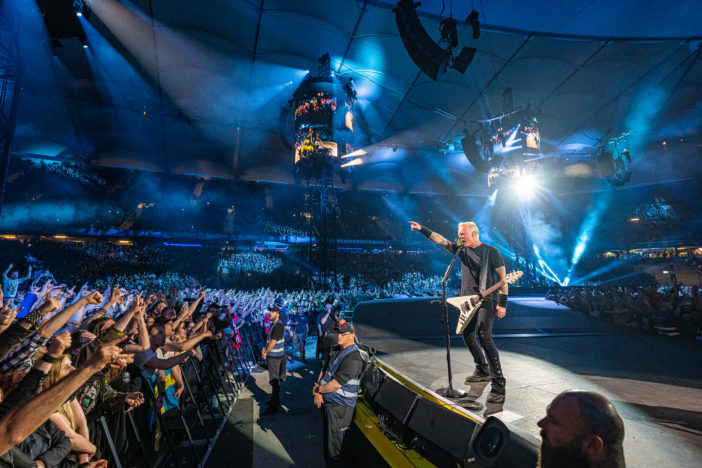
Braun also credited the new Panther line array loudspeakers as a key component in realising the concept: “The clarity of the system is breath-taking, and that combined with Bob McCarthy’s brilliant design is giving us a show that sounds spectacular.”
Crafting the Metallica sound from FOH is Greg Price, a veteran known for his long stints not only with hard rock legends Black Sabbath and Ozzy Osbourne, but also for pop acts including The Glee Show on Tour, Hannah Montana/Miley Cyrus, and Chicago.
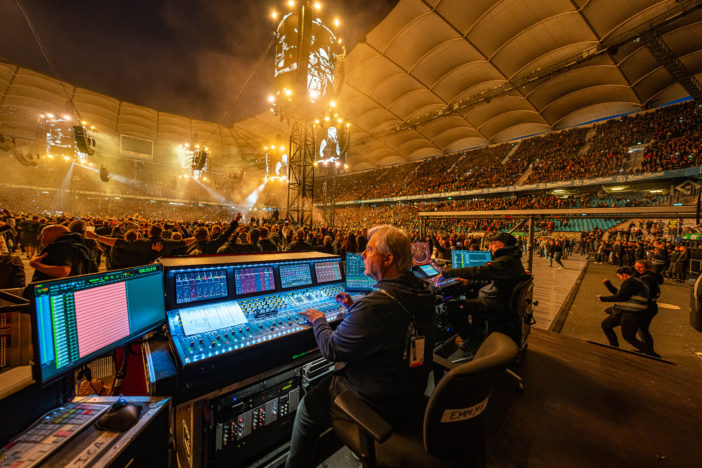
“We’re only a few shows into the tour and so far I’m very impressed,” said Price. “I would have to say that I don’t think there is any other PA manufacturer in the world that could take on what we are trying to do on this tour.”
As for the massive Panther arrays, Price described them as “a PA system that acts like a reference monitor, like an Amie or a Bluehorn in the studio. I’m hearing things in my mixing that I always knew were there but lacked definition. Now they are right in my face, and I can work with them.”
The M72 World Tour system is deployed in three concentric rings. The outer ring arrays are suspended from eight towers, with two Panther arrays on each tower: 16 cabinets per array on the four long-side towers and 13 cabinets on the four short-side towers. Each tower also carries dual hangs of six-each 1100-LFC low-frequency control elements and one set of six VLFC very low-frequency control elements.
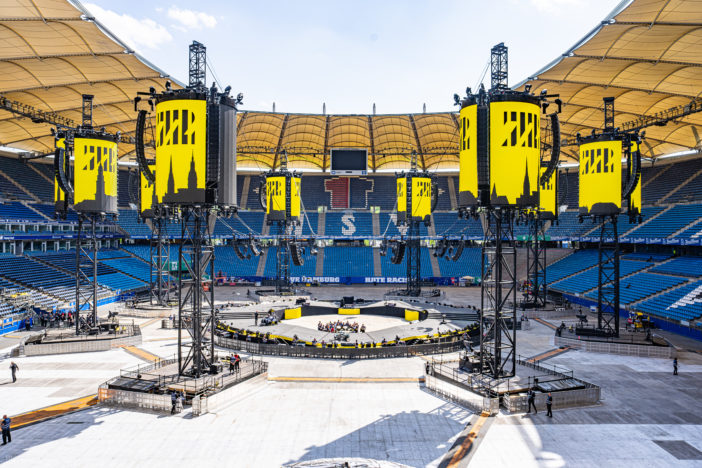
The inner system, suspended from a web over the stage, has eight hangs of seven-each Panther line array loudspeakers, providing stereo coverage out to 42m from centre. The ‘doughnut hole’ in the stage centre is covered by eight inward-firing UPQ-D2 narrow coverage loudspeakers, while the outer side of the ring employs 20 Ultra-X40 compact loudspeakers as front fill. Ground sub-bass is powered by eight sets of 2x 1100-LFC elements around the stage.
The entire system is connected, controlled and monitored over three Milan AVB networks. One network connects Milan directly to all 288 Panther loudspeakers via 10 Galileo Galaxy 408 and two Galileo Galaxy 816 Network Platforms using a fibre network incorporating 26 Luminex Gigacore switches. The other two networks are primary and secondary networks for signal distribution and monitoring of the remaining analogue Meyer Sound loudspeakers as well as providing redundant analogue inputs to the Panther loudspeakers. The three networks comprise 52 Luminex switches and 35 Galaxy Network Platforms. Meyer Sound’s new Nebra software platform manages all network configuration, connection and real-time system monitoring.
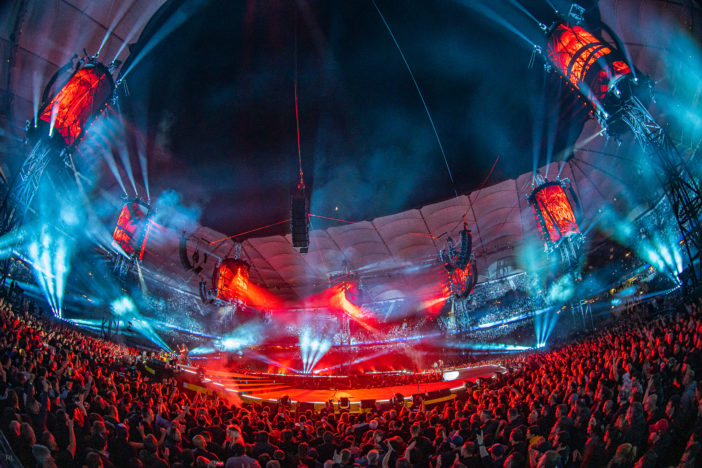
The M72 World Tour also employs Meyer Sound’s Spacemap Go spatial sound design and mixing tool to a limited extent. As an intro to One, the rumble and roar of a four-engine vintage bomber circles the stadium. “We had some people outside wondering if there was a real plane flying around in the stadium,” said Price. “But Metallica is a straight-ahead band and not into trickery. The focus with spatial audio for Metallica is to enhance show content, remaining true to the band’s performance.”
The M72 World Tour is supported by Clair Global, and Price gave a tip of the hat to the company’s logistical resources and depth of expertise. “We salute Clair Global for their tremendous effort in building the M72 audio systems,” he said.
Metallica’s M72 World Tour launched on 27 April and is scheduled for two European legs and two North American legs, wrapping up on 29 September 2024.
Images: Ralph Larmann


